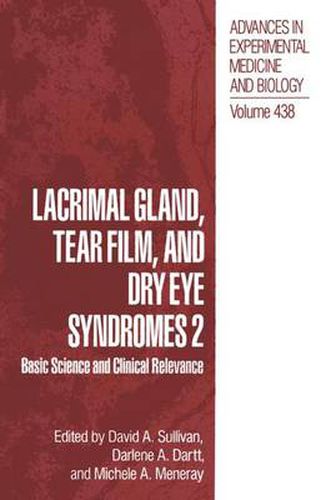Lacrimal Gland, Tear Film, and Dry Eye Syndromes 2: Basic Science and Clinical Relevance

Lacrimal Gland, Tear Film, and Dry Eye Syndromes 2: Basic Science and Clinical Relevance
During the past two decades, a significant international research effort has been di rected toward understanding the composition and regulation of the preocular tear film. This effort has been motivated by the recognition that the tear film plays an essential role in maintaining corneal and conjunctival integrity, protecting against microbial challenge, and preserving visual acuity. In addition, research has been stimulated by the knowledge that alteration or deficiency of the tear film, which occurs in countless individuals throughout the world, may lead to desiccation of the ocular surface, ulceration and perfo ration of the cornea, an increased incidence of infectious disease, and, potentially, pro nounced visual disability and blindness. To promote further progress in this field of vision research, the Second International Conference on the Lacrimal Gland, Tear Film and Dry Eye Syndromes: Basic Science and Clinical Relevance was held at the Southampton Princess Resort in Bermuda November 16-19, 1996. This conference was organized and directed by David A. Sullivan, Ph. D. , codirected by Darlene A. Dartt, Ph. D. , and Michele A. Meneray, Ph. D. , and sponsored by the Schepens Eye Research Institute (Boston, MA), an affiliate of Harvard Medical School. The meeting was designed to assess critically the current knowledge and state of the art research on the structure and function of lacrimal tissue, tears, and the ocular sur face in both health and disease.
This item is not currently in-stock. It can be ordered online and is expected to ship in approx 4 weeks
Our stock data is updated periodically, and availability may change throughout the day for in-demand items. Please call the relevant shop for the most current stock information. Prices are subject to change without notice.
Sign in or become a Readings Member to add this title to a wishlist.


